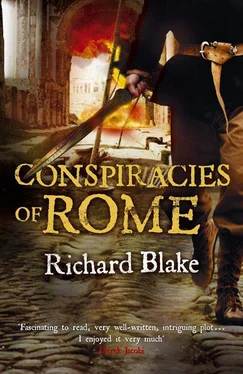Richard Blake - Conspiracies of Rome
Здесь есть возможность читать онлайн «Richard Blake - Conspiracies of Rome» весь текст электронной книги совершенно бесплатно (целиком полную версию без сокращений). В некоторых случаях можно слушать аудио, скачать через торрент в формате fb2 и присутствует краткое содержание. Жанр: Исторические приключения, на английском языке. Описание произведения, (предисловие) а так же отзывы посетителей доступны на портале библиотеки ЛибКат.
- Название:Conspiracies of Rome
- Автор:
- Жанр:
- Год:неизвестен
- ISBN:нет данных
- Рейтинг книги:3 / 5. Голосов: 1
-
Избранное:Добавить в избранное
- Отзывы:
-
Ваша оценка:
- 60
- 1
- 2
- 3
- 4
- 5
Conspiracies of Rome: краткое содержание, описание и аннотация
Предлагаем к чтению аннотацию, описание, краткое содержание или предисловие (зависит от того, что написал сам автор книги «Conspiracies of Rome»). Если вы не нашли необходимую информацию о книге — напишите в комментариях, мы постараемся отыскать её.
Conspiracies of Rome — читать онлайн бесплатно полную книгу (весь текст) целиком
Ниже представлен текст книги, разбитый по страницам. Система сохранения места последней прочитанной страницы, позволяет с удобством читать онлайн бесплатно книгу «Conspiracies of Rome», без необходимости каждый раз заново искать на чём Вы остановились. Поставьте закладку, и сможете в любой момент перейти на страницу, на которой закончили чтение.
Интервал:
Закладка:
It wasn’t all bad in Richborough, you know. I was too young to remember the time before Ethelbert had killed my father and taken our lands. While they were alive, my brothers would tell me what scraps they could themselves remember. My mother never spoke of the past.
So Richborough was all I really had. I was happy enough there as a child. I’d run about with the other boys, playing at hide-and-seek in the empty shells of the administrative buildings. Often, I’d climb onto the broken walls to watch the grey, surging waves of the Channel.
I even got an education there. When I was seven, I went to the school run by Auxilius. He’d killed a man in France. Even under King Chilperic, that was considered not quite proper for a man of the cloth. So he’d gone on the run. Safe in Richborough, he’d taken a wife and some students.
He used to teach in a little church that still had most of its roof. ‘I am a man of God,’ he would say. ‘Therefore, God’s house is mine.’
To be fair, no one else wanted the place. The few Christians left in town were even more lapsed than he was. He taught me and a few of the other boys in town. In return, we dug his garden and took him drink and whatever food we could lift from the local villages. What I remember most about him is his pockmarked face and his habit of blowing his nose on the ragged hem of his monastic robe – I don’t think he had any other clothes. But he was a good teacher.
He started me on scratching the letters and syllable combinations on bits of broken roof tile. Then he taught me the use of a stylus he’d dug out of the ruined basilica. Bronze, a point at one end, a flat blade at the other, this had been used in the old days for writing on wax tablets. In small things as in great, Auxilius believed in the old ways, and he had me and the others smearing mutton fat on small pieces of board. He would dictate. When I’d got it right, I had to wipe the fat smooth and start on the next task.
On hot days, he’d take us round what was left of the town, getting us to read the inscriptions. Or we’d go out to one of the graveyards. In those days, the stones were still in place, not yet taken off to build into walls. To my knowledge, he never instructed anyone in the Faith. But he could really bring the stick out for linguistic faults. He wasn’t interested in teaching the debased, conversational Latin of our age. What he gave us was the pure language. ‘ Petere fontes,’ he used to say as he let us read from the few books he’d stolen before going on the run from his monastery – ‘Go to the sources.’
If I now preside over the greatest centre of learning this side of the Balkans, it is due to the start Auxilius gave me in that crumbling church, with a pigsty at one end and a tree pushing up the mosaic pavement in the middle.
I saw him again only once after my mother’s funeral. As soon as he heard the news, Ethelbert relieved me of any family duties I might have inherited. He took my half-sister away – she was his child, after all, and he was thinking to marry her to one of his grade-two retainers. Then he had me thrown into the street. His men turned up on the third day after the funeral. They took a silver brooch that had been my mother’s only remnant of our old standing, and chased me out of the house.
What Ethelbert wanted with the place I never did learn, but it was one of the few buildings in town with a sound roof. As I picked up my only change of clothes, which they’d tossed into the mud, his men advised me to go sell my arse in Canterbury if I didn’t want to starve.
But that sealed reference to Maximin from Auxilius saved me from both. How they knew each other is unimportant. Why they were in touch is simple. The work of claiming England for the Faith was more important than remembering old and distant crimes.
When I wasn’t out faking miracles with Maximin, I’d sit in the mission library to continue my education. I can’t say the majority of the books there were to my taste. They were mostly lives of saints or diatribes against the Arian and Monophysite heresies. Bishop Lawrence was always very hot against these, and he had the missionaries asking incomprehensible questions of the converts about the relative status of the Father and the Son. I had enough trouble myself with the orthodoxy of three gods in one, and soon gave up on interpreting the questions Maximin put through me.
What I loved was the small collection of ancient writings that had been sent over from Rome. Opening a volume of Cicero was like stepping from deep shadow into the sunlight. This meant far more to me than the matter of baptism. It was through Cicero that I made my first acquaintance with the sceptics and with the great master of all wisdom – Epicurus. Oh, what a revelation he was through Cicero. It was as if a lamp had been set alight in my head. Or perhaps it was that I’d been given words to express what I already knew by instinct – that happiness, rightly understood, is the purpose of life; that knowledge of the world as it is must be the key to happiness; that the world works according to laws that we can investigate through our own rational faculties; that no authority, whether religious or secular, should be allowed to stand in the way of our individual search for the ‘good life’.
I was young. The Church was part of an obviously higher civilisation than my own. I was eating its bread. I was in a part of the world where its priests were necessarily all devout believers. I might have been got properly for the Church. But, good and often greatly good man as he was, Maximin was the last person to be set over anyone of intelligence whose mind was already inclined to scepticism. With his endless pious frauds, he gave me no reason to believe in the claims of the Church. With the little that I read and the much more that I inferred in the mission library, I had every reason not to believe a word of those claims.
But for the knock on the head, I suppose I might have given in to Maximin’s urging and gone into the Church. He was increasingly sure he could get the rules set aside in my favour. After my last appointment with Ethelbert, though, there could be no more talk of accelerated ordination, or any other place for me in the English Church.
It was to be Rome now or nothing.
In the event, it was nearly both.
4
There is no pleasure, I have always thought, at once so selfish and yet so intense as a good shit. And I’d just had a very good one. Its cause was last night’s meal, our first real one in a couple of days – Italian bread, olives, fish from the sea, which we’d roasted on the beach, and a big jar of wine we’d got in return for some of our bread.
We were on the Aurelian Way, somewhere between Populonium and Telamon. Rome was still a few days along the road. I’d dodged off the road for my shit, leaving Maximin to fix breakfast, and was now washing myself in a little stream that ran down to the sea. Birds sang in the trees around me. Above, a spring sun shone from a cloudless sky, warming me after the night frost.
That, though – considerable as it was – marked the limits of my pleasure. I’d grown up in a world of ruins, and nothing much should have affected me. But my people had moved into England centuries before, and had completed their work of destruction long before I was born. We’d driven out the Romans, pushing them west and southwest, or across the Channel, and had looted and burned until precious little remained. By my time, we held the land, and the few bits of town that were left had become wretched, crumbling places, the ruins mostly decorously hidden under little mounds. Until the missionaries turned up and began the rebuilding, it was a world of balance, in which the old was passing out of memory and the new becoming immemorial.
Читать дальшеИнтервал:
Закладка:
Похожие книги на «Conspiracies of Rome»
Представляем Вашему вниманию похожие книги на «Conspiracies of Rome» списком для выбора. Мы отобрали схожую по названию и смыслу литературу в надежде предоставить читателям больше вариантов отыскать новые, интересные, ещё непрочитанные произведения.
Обсуждение, отзывы о книге «Conspiracies of Rome» и просто собственные мнения читателей. Оставьте ваши комментарии, напишите, что Вы думаете о произведении, его смысле или главных героях. Укажите что конкретно понравилось, а что нет, и почему Вы так считаете.












